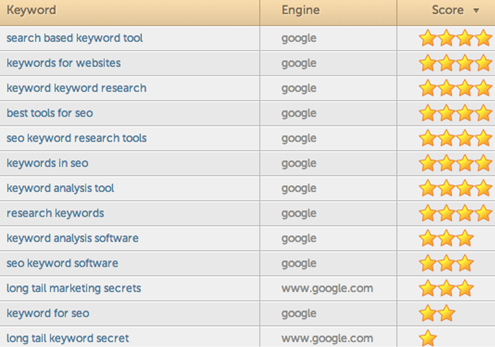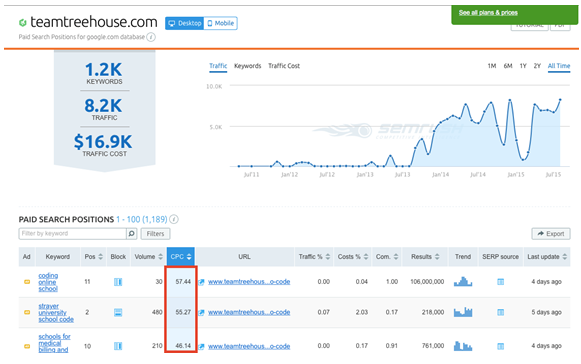5 Tools for Finding High-Value Long-Tail Keywords
Valuable doesn't necessarily mean expensive. Relevant long-tail keywords are often cheaper and lead to more conversions; here are five tools to help you find them.
Valuable doesn't necessarily mean expensive. Relevant long-tail keywords are often cheaper and lead to more conversions; here are five tools to help you find them.
All keywords are not created equal. I’ve seen too many business owners get hung up on chasing after highly competitive keywords, only to find that these keywords don’t actually result in conversions. This is why finding high-value keywords is so critical. Ultimately, we want to pinpoint and target keywords that will attract visitors who are specifically looking for what we have to offer.
Old school keyword research was more concerned with generating high quantities of traffic, regardless of how well that traffic converted. Ranking for “web design” and generating thousands of visits per month was thought to be preferable to ranking for, say, “best company to build a business website,” and only attracting a few dozen visits.
In today’s landscape, we’re much more concerned with user intent: finding and using keywords that match the underlying intention behind search behavior. When we can attract highly-qualified traffic and then provide exactly what our visitors are looking for, we provide a far better user experience, which ultimately means more conversions.
One of my favorite strategies for finding high-value keywords is to target highly-specific long-tail keywords: phrases that will do a great job of matching user intent. In addition to being far more likely to result in conversions, these will also generally be easier to rank for and cheaper to bid on.
A tool like HitTail can help by suggesting long-tail keywords via a visual long-tail chart. Using its proprietary algorithm, the tool looks at your existing traffic to determine which long-tail phrases you should be targeting to grow your traffic.

Another strategy for finding long-tail keywords is to use Google Related Searches. Enter your desired keywords into Google Search and then scroll down the page until you see “Searches related to _________.”
The key to using this strategy is starting by searching for a long-tail phrase. If you use a short phrase, you’ll simply end up with other short phrase suggestions; these will, of course, be more general and less often, less lucrative. For this reason, I like to use HitTail first to find some long-tail suggestions and then build off these phrases. If your phrase is too long and specific, you may not receive any suggestions from Google. Try to find a search phrase that’s no more than three or four words long.

If you’re prepared to spend some time and money on your research, I would recommend compiling a list of keywords you suspect will lead to conversions and then running your own PPC campaign to see which ones actually do. Generally speaking, I would recommend long-tail keywords that signal some level of purchase intent. For instance, someone searching for “web design firm Seattle” is far more likely to be looking to hire you for design work than someone searching simply for “web design,” which could, for example, simply be a student looking to learn about web design.
Once you’ve come up with a list, run an AdWords campaign for at least a few weeks (longer is better) to see which keyword phrases lead to conversions. While this strategy requires patience and money, it’s one of the most effective ways to pinpoint keywords that actually convert with your audience.
I highly recommend using a tool like SEMRush to find high value keywords your competitors are using. First, make a list of your top competitors. These could be small but successful niche sites, or larger sites that own a huge share of traffic in your industry.
Start by entering one of these URLs into SEMRush. What we’re most interested in here is the CPC of the paid traffic they’re targeting. Click on Paid Search to be taken to a list of the top keywords the site is currently bidding on. Click View Full Report and then sort by CPC; the keywords with the highest CPC will now be at the top of the list.

In the example above, you can see that this web design site is paying up to $57 for keyword phrases like “coding online school,” which is a great indication that this is a high-value phrase that generates strong conversions.
This is a common sense approach, but one that often gets neglected. Chances are, you already rank for at least a few high-value keywords with your existing content. Look through Google Search Console to determine which keywords are already achieving conversions, and build off them. Also, look for keywords that are ranking pretty well already that with some tweaking, might rank even better. These are low-hanging fruit opportunities.
To do this, open Google Search Console and navigate to Search Traffic/Search Analytics. From there, you can sort through your most popular keywords, along with the number of clicks, impressions, CTR, and average ranking position in Google.

Select the Pages option at the top to see which pages rank for each keyword. Once you’ve identified a handful of pages and keywords that you’d like to focus on improving, optimize them from an on-site SEO perspective, such as optimizing the technical meta elements, as well as the internal linking structure to those pages. Then, start a link-building campaign to get more links pointing to those pages.
For an in-depth walk-through on using Google Search Console for keyword research, see this article.
Keep in mind that high value doesn’t necessarily mean expensive. While more costly keywords can result in high conversion rates, choosing highly-relevant long-tail phrases can actually be less expensive and result in higher conversions than their more pricey counterparts. The important thing is to figure out which keywords bring value to your site and your audience.
How do you find high value keywords for your site? Share below!